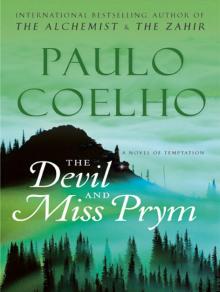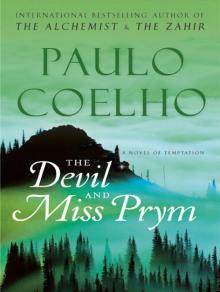- Home
- Paulo Coelho
The Devil and Miss Prym: A Novel of Temptation Page 12
The Devil and Miss Prym: A Novel of Temptation Read online
Page 12
There was a moment of general embarrassment.
"Well, you know, old people can die at any time," Berta went on.
Things had returned to normal. Or almost.
"It's far too soon for you to be talking like that."
"Maybe you're right; tomorrow is another day, as they say. But I don't mind telling you that it's been on my mind a lot today."
"For any particular reason?"
"Do you think there should be?"
The hotel landlady wanted to change the subject, but she had to do so very carefully. By now, the meeting in the square must have begun and it would be over in a few minutes.
"I think that, with age, people come to realize that death is inevitable. And we need to learn to face it with serenity, wisdom and resignation. Death often frees us from a lot of senseless suffering."
"You're quite right," Berta replied. "That's exactly what I was thinking this afternoon. And do you know what conclusion I came to? I'm very, very afraid of dying. I don't think my time has quite come."
The atmosphere in the room was getting tenser and tenser, and the mayor's wife remembered the discussion in the sacristy about the land beside the church; they were talking about one thing, but meaning something else entirely.
Neither of the two women knew how the meeting in the square was going; neither of them knew what the priest's plan was, or what the reaction of the men of Viscos would be. It was pointless trying to talk more openly with Berta; after all, no one accepts being killed without putting up a fight. She made a mental note of the problem: if they wanted to kill the old woman, they would have to find a way of doing so that would avoid a violent struggle that might leave clues for any future investigation.
Disappear. The old woman would simply have to disappear. Her body couldn't be buried in the cemetery or left on the mountainside; once the stranger had ascertained that his wishes had been met, they would have to burn the corpse and scatter the ashes in the mountains. So in both theory and in practice, Berta would be helping their land become fertile again.
"What are you thinking?" Berta asked, interrupting her thoughts.
"About a bonfire," the mayor's wife replied. "A lovely bonfire that would warm our bodies and our hearts."
"It's just as well we're no longer in the Middle Ages, because, you know, there are some people in the village who say I'm a witch."
There was no point in lying, the old woman would only become suspicious, so the two women nodded their agreement.
"If we were in the Middle Ages, they might want to burn me alive, just like that, just because someone decided I must be guilty of something."
"What's going on here?" the hotel landlady was wondering to herself. "Could someone have betrayed us? Could it be that the mayor's wife, who's here with me now, came over earlier and told her everything? Or could it be that the priest suddenly repented and came to confess himself to this sinner?"
"Thank you so much for your visit, but I'm fine, really, in perfect health, ready to make every necessary sacrifice, including being on one of those stupid diets to lower my cholesterol levels, because I want to go on living for a long while yet."
Berta got up and opened the door. The two women said goodbye to her. The meeting in the square had still not finished.
"I'm so pleased you came. I'm going to stop my crocheting now and go to bed. And to tell you the truth, I believe in the rogue wolf. Now since you two are so much younger than I, would you mind hanging around until the meeting finishes and make quite sure that the wolf doesn't come to my door?"
The two women agreed, bade her goodnight, and Berta went in.
"She knows!" the hotel landlady whispered. "Someone has told her! Didn't you notice the ironic tone in her voice? She knows we're here to keep an eye on her."
The mayor's wife was confused.
"But how can she know? No one would be so crazy as to tell her. Unless..."
"Unless she really is a witch. Do you remember the hot wind that suddenly blew into the sacristy while we were talking?"
"Even though the windows were shut."
The hearts of the two women contracted and centuries of superstitions rose to the surface. If Berta really was a witch, then her death, far from saving the village, would destroy it completely.
Or so the legends said.
Berta switched off the light and stood watching the two women in the street out of a corner of her window. She didn't know whether to laugh or cry, or simply to accept her fate. She was sure of one thing, though, she had been marked out to die.
Her husband had appeared earlier that evening, and to her surprise, he was accompanied by Miss Prym's grandmother. Berta's first reaction was one of jealousy: what was he doing with that woman? But then she saw the worried look on both of their faces, and became even more troubled when she heard what they had to say about what had gone on in the sacristy.
The two of them told her to run away at once.
"You must be joking," Berta replied. "How am I supposed to run away? My legs can barely carry me the hundred yards to church, so how could I possibly walk all the way down the road and out of the village? Please, sort this problem out up in heaven and do something to protect me! After all, why else do I spend my time praying to all the saints?"
It was a much more complicated situation than Berta could imagine, they explained: Good and Evil were locked in combat, and no one could interfere. Angels and devils were in the midst of one of the periodic battles that decide whether whole regions of the earth are to be condemned for a while or saved.
"I'm not interested; I have no way of defending myself, this isn't my fight, I didn't ask to be caught up in it."
Nobody had. It had all begun two years earlier with a mistake made by a guardian angel. During a kidnapping, two women were marked out to die, but a little three-year-old girl was supposed to be saved. This girl, it was said, would be a consolation to her father and help him to maintain some hope in life and overcome the tremendous suffering he would undergo. He was a good man, and although he would have to endure terrible suffering (no one knew why, that was all part of God's plan, which had never been fully explained), he would recover in the end. The girl would grow up marked by the tragedy and, when she was twenty, would use her own suffering to help alleviate that of others. She would eventually do work of such vital importance that it would have an impact all over the world.
That had been the original plan. And everything was going well: the police stormed the hideout, shots started flying and the people chosen to die began to fall. At that moment, the child's guardian angel--as Berta knew, all three-year-olds can see and talk to their guardian angels all the time--signaled to her to crouch down by the wall. But the child did not understand and ran towards him so that she could hear better.
She moved barely a matter of inches, just enough to be struck by a fatal bullet. From then on, the story took a new twist. What was meant to become an edifying story of redemption turned into a merciless struggle. The devil made his appearance, claiming that the man's soul should be his, being as it was full of hatred, impotence and a desire for vengeance. The angels could not accept this; he was a good man and had been chosen to help his daughter make great changes in the world, even though his profession was hardly ideal.
But the angels' arguments no longer rang true to him. Bit by bit, the devil took over his soul, until now he controlled him almost completely.
"Almost completely," Berta repeated. "You said 'almost.'"
They agreed. There was still a tiny chink of light left, because one of the angels had refused to give up the fight. But he had never been listened to until the previous night, when he had managed briefly to speak out. And his instrument had been none other than Miss Prym.
Chantal's grandmother explained that this was why she was there; because if anyone could change the situation, it was her granddaughter. Even so, the struggle was more ferocious than ever, and the stranger's angel had again been silenced by the presence of t
he devil.
Berta tried to calm them down, because they both seemed very upset. They, after all, were already dead; she was the one who should be worried. Couldn't they help Chantal change the course of things?
Chantal's devil was also winning the battle, they replied. When Chantal was in the forest, her grandmother had sent the rogue wolf to find her--the wolf did, in fact, exist, and the blacksmith had been telling the truth. She had wanted to awaken the stranger's good side and had done so. But apparently the argument between the two of them had got them nowhere; they were both too stubborn. There was only one hope left: that Chantal had seen what they wanted her to see. Or rather, they knew she had seen it, but what they wanted was for her to understand what she had seen.
"What's that?" Berta asked.
They refused to say. Their contact with human beings had its limits, there were devils listening in to their conversation who could spoil everything if they knew of the plan in advance. But they insisted it was something very simple, and if Chantal was as intelligent as her grandmother said she was, she would know how to deal with the situation.
Berta accepted this answer; the last thing she wanted was an indiscretion that might cost her her life, even though she loved hearing secrets. But there was something she still wanted explained and so she turned to her husband:
"You told me to stay here, sitting on this chair all these years, watching over the village in case Evil entered it. You asked that of me long before that guardian angel made a mistake and the child was killed. Why?"
Her husband replied that, one way or another, Evil was bound to pass through Viscos, because the Devil was always abroad in the Earth, trying to catch people unawares.
"I'm not convinced."
Her husband was not convinced either, but it was true. Perhaps the fight between Good and Evil is raging all the time in every individual's heart, which is the battleground for all angels and devils; they would fight inch by inch for thousands of millennia in order to gain ground, until one of them finally vanquished the other. Yet even though he now existed on a spiritual plane, there were still many things he did not understand--many more, in fact, than on Earth.
"You've convinced me. Go and rest; if I have to die, it will be because my hour has come."
Berta did not say that she felt slightly jealous and would like to be with her husband again; Chantal's grandmother had always been one of the most sought-after women in the village.
They left, claiming that they had to make sure the girl had understood what she had seen. Berta felt even more jealous, but she managed to calm herself, even though she suspected that her husband only wanted to see her live a little longer so that he could enjoy the company of Chantal's grandmother undisturbed.
Besides, the independence he thought he was enjoying might well come to an end the very next day. Berta considered a little and changed her mind: the poor man deserved a few years' rest, it was no hardship to let him go on thinking he was free to do as he liked--she was sure he missed her dreadfully.
Seeing the two women still on guard outside her house, she thought it wouldn't be so bad to be able to stay a while longer in that valley, staring up at the mountains, watching the eternal conflicts between men and women, the trees and the wind, between angels and devils. Then she began to feel afraid and tried to concentrate on something else--perhaps tomorrow she would change the color of the ball of yarn she was using; the tablecloth was beginning to look distinctly drab.
Before the meeting in the square had finished, she was fast asleep, sure in her mind that Miss Prym would eventually understand the message, even if she did not have the gift of speaking with spirits.
"In church, on hallowed ground, I spoke of the need for sacrifice," the priest said. "Here, on unhallowed land, I ask you to be prepared for martyrdom."
The small, dimly lit square--there was still only one streetlamp, despite the mayor's pre-election promises to install more--was full to overflowing. Peasants and shepherds, drowsy-eyed because they were used to going to bed and rising with the sun, stood in respectful, awed silence. The priest had placed a chair next to the cross and was standing on it so that everyone could see him.
"For centuries, the Church has been accused of fighting unjust battles, when, in reality, all we were doing was trying to survive threats to our existence."
"We didn't come here to hear about the Church, Father," a voice shouted. "We came to find out about Viscos."
"I don't need to tell you that Viscos risks disappearing off the map, taking with it you, your lands and your flocks. Nor did I come here to talk about the Church, but there is one thing I must say: only by sacrifice and penitence can we find salvation. And before I'm interrupted again, I mean the sacrifice of one person, the penitence of all and the salvation of this village."
"It might all be a lie," another voice cried out.
"The stranger is going to show us the gold tomorrow," the mayor said, pleased to be able to give a piece of information of which even the priest was unaware. "Miss Prym does not wish to bear the responsibility alone, so the hotel landlady persuaded the stranger to bring the gold bars here. We will act only after receiving that guarantee."
The mayor took over and began telling them about the improvements that would be made to life in the village: the rebuilding work, the children's playground, the reduced taxes and the planned redistribution of their newly acquired wealth.
"In equal shares," someone shouted.
It was time for the mayor to take on a commitment he hated to make; as if suddenly awoken from their somnolent state, all eyes were turned in his direction.
"In equal shares," the priest said, before the mayor could respond. There was no other choice: everyone had to take part and bear the same responsibility and receive the same reward, otherwise it would not be long before someone denounced the crime--out of either jealousy or vengeance. The priest was all too familiar with both those words.
"Who is going to die?"
The mayor explained the fair process by which Berta had been chosen: she suffered greatly from the loss of her husband, she was old, had no friends, and seemed slightly mad, sitting outside her house from dawn to dusk, making absolutely no contribution to the growth of the village. Instead of her money being invested in lands or sheep, it was earning interest in some far-off bank; the only ones who benefited from it were the traders who, like the baker, came every week to sell their produce in the village.
Not a single voice in the crowd was raised against the choice. The mayor was glad because they had accepted his authority; but the priest knew that this could be a good or a bad sign, because silence does not always mean consent--usually all it meant was that people were incapable of coming up with an immediate response. If someone did not agree, they would later torture themselves with the idea that they had accepted without really wanting to, and the consequences of that could be grave.
"I need everyone here to agree," the priest said. "I need everyone to say out loud whether they agree or disagree, so that God can hear you and know that He has valiant men in His army. If you don't believe in God, I ask you all the same to say out loud whether you agree or disagree, so that we will all know exactly what everyone here thinks."
The mayor did not like the way the priest had used the verb "need": "I need" he had said, when it would have been more appropriate to say: "we need," or "the mayor needs." When this business was over, he would have to reimpose his authority in whatever way was necessary. Now, like a good politician, he would let the priest take the lead and expose himself to risk.
"I want you all to say that you agree."
The first "yes" came from the blacksmith. Then the mayor, to show his courage, also said "yes" in a loud voice. One by one, every man present declared out loud that they agreed with the choice--until they had all committed themselves. Some of them did so because they wanted to get the meeting over and done with so that they could go home; some were thinking about the gold and about the quickest way th
ey could leave the village with their newly acquired wealth; others were planning to send money to their children so that they would no longer have to feel ashamed in front of their friends in the big city. Almost no one in the crowd believed that Viscos would regain its former glory; all they wanted was the riches they had always deserved, but had never had.
But no one said "no."
"One hundred eight women and 173 men live in this village," the priest went on. "Since it is the tradition here for everyone to learn how to hunt, each inhabitant owns at least one shotgun. Well, tomorrow morning, I want you each to leave a shotgun in the sacristy, with a single cartridge in it. I'm asking the mayor, who has more than one gun, to bring one for me as well."
"We never leave our weapons with strangers," a hunting guide shouted. "Guns are sacred, temperamental, personal. They should never be fired by other people."
"Let me finish. I'm going to explain how a firing squad works. Seven soldiers are chosen to shoot the condemned man. Seven rifles are handed out to the squad, but only six of them are loaded with real bullets, the seventh contains a blank. The gunpowder explodes in exactly the same way, the noise is identical, but there's no lead to be fired into the victim's body.
"None of the soldiers knows which rifle contains the blank. In that way, each of them thinks that his gun contained the blank and that his friends were responsible for the death of the man or woman none of them knew, but whom they were forced to shoot in the line of duty."
"So all of them believe they are innocent," the landowner chimed in, speaking for the first time.
"Exactly. Tomorrow I will do the same: I'll take the lead out of eighty-seven of the cartridges and leave the other shotguns with live ammunition in them. All the weapons will go off at the same time, but no one will know which of them has pellets inside; in that way, all of you can consider yourselves innocent."
Tired though the men were, they greeted the priest's idea with a huge sigh of relief. A different kind of energy spread through the crowd as if, from one hour to the next, the entire situation had lost its tragic air and had been transformed into a simple treasure hunt. Every man was convinced that his gun would carry the blank ammunition, and that he would not therefore be guilty; he was simply showing solidarity with his fellows, who wanted to change their lives and where they lived. Everyone was excited now; at last, Viscos had become a place where different, important things happened.

 The Alchemist
The Alchemist Maktub
Maktub Like the Flowing River
Like the Flowing River The Winner Stands Alone
The Winner Stands Alone The Spy
The Spy By the River Piedra I Sat Down and Wept: A Novel of Forgiveness
By the River Piedra I Sat Down and Wept: A Novel of Forgiveness Eleven Minutes
Eleven Minutes Manuscript Found in Accra
Manuscript Found in Accra Warrior of the Light
Warrior of the Light Veronika Decides to Die: A Novel of Redemption
Veronika Decides to Die: A Novel of Redemption The Devil and Miss Prym: A Novel of Temptation
The Devil and Miss Prym: A Novel of Temptation The Valkyries: An Encounter With Angels
The Valkyries: An Encounter With Angels Brida: A Novel
Brida: A Novel Fifth Mountain: A Novel
Fifth Mountain: A Novel Adultery
Adultery Inspirations
Inspirations The Archer
The Archer The Witch of Portobello
The Witch of Portobello The Pilgrimage
The Pilgrimage The Zahir
The Zahir Brida
Brida The Fifth Mountain
The Fifth Mountain Like the Flowing River: Thoughts and Reflections
Like the Flowing River: Thoughts and Reflections Manual of the Warrior of Light
Manual of the Warrior of Light By The River Piedra I Sat Down & Wept
By The River Piedra I Sat Down & Wept The Supreme Gift
The Supreme Gift Aleph
Aleph Hippie
Hippie Witch of Portobello
Witch of Portobello The Devil and Miss Prym
The Devil and Miss Prym The Alchemist - 10th Anniversary Edition
The Alchemist - 10th Anniversary Edition The Valkyries
The Valkyries